In this week’s Trend Lines podcast, WPR’s editor-in-chief, Judah Grunstein, and associate editor, Elliot Waldman, discuss British Prime Minister Theresa May’s week of humiliations on the shambolic road to Brexit. For the Report, Frederic Wehrey talks with WPR’s senior editor, Robbie Corey-Boulet, about the growing power and influence of the “quietist” current of Salafism in the Maghreb and what that means for the region.
If you like what you hear on Trend Lines and what you’ve read on WPR, you can sign up for our free newsletter to get our uncompromising analysis delivered straight to your inbox. The newsletter offers a free preview article every day of the week, plus three more complimentary articles in our weekly roundup every Friday. Sign up here. Then subscribe.
Listen:
Download: MP3
Subscribe: iTunes | RSS | Spotify
Relevant Articles on WPR:
Trend Lines is produced and edited by Peter Dörrie, a freelance journalist and analyst focusing on security and resource politics in Africa. You can follow him on Twitter at @peterdoerrie.
To send feedback or questions, email us at podcast@worldpoliticsreview.com.

